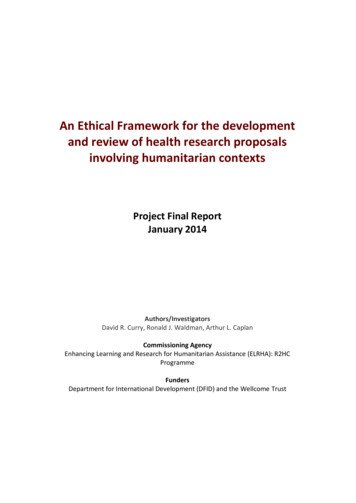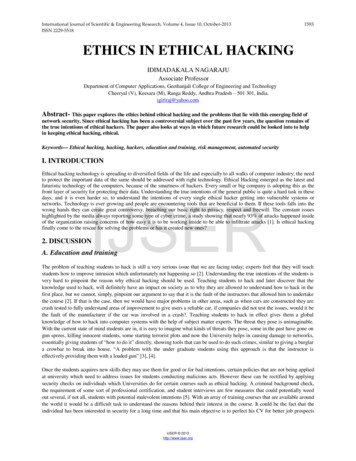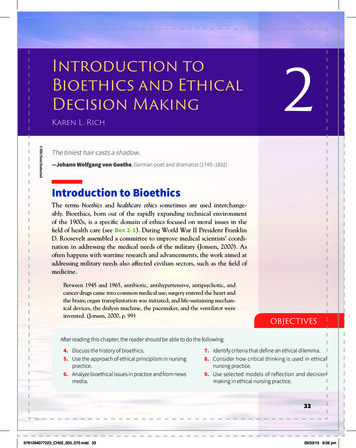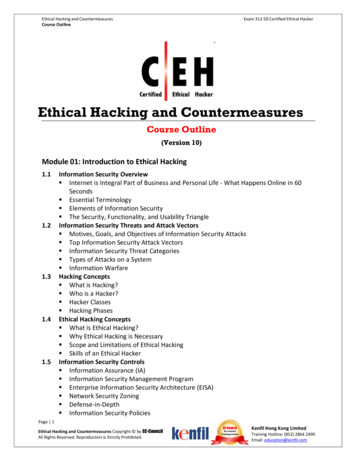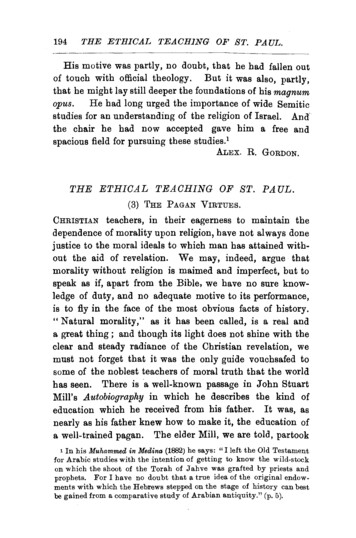
Transcription
194THE ETHICAL TEACHING OF ST. PAUL.His motive was partly, no doubt, that he had fallen outof touch with official theology. But it was also, partly,that he might lay still deeper the foundations of his magnumHe had long urged the importance of wide Semiticopus.studies for an understanding of the religion of Israel. Ana·the chair he had now accepted gave him a free andspacious field for pursuing these studies. 1ALEX. R. GORDON.THE ETHICAL TEACHING OF ST. PAUL.(3) 'rHE PAGAN VIRTUES.CHRISTIAN teachers, in their eagerness to maintain thedependence of morality upon religion, have not always donejustice to the moral ideals to which man has attained without the aid of revelation. We may, indeed, argue thatmorality without religion is maimed and imperfect, but tospeak as if, apart from the Bible, we have no sure knowledge of duty, and no adequate motive to its performance,is to fly in the face of the most obvious facts of history."Natural morality," as it has been called, is a real anda great thing ; and though its light does not shine with theclear and steady radiance of the Christian revelation, wemust not forget that it was the only guide vouchsafed tosome of the noblest teachers of moral truth that the worldbas seen. There is a well-known passage in John StuartMill's Autobiography in which he describes the kind ofeducation which he received from his father. It was, asnearly as his father knew how to make it, the education ofa well-trained pagan. The elder Mill, we are told, partook1 In his Muhammed in Medina (1882) he says: "I left the Old Testamentfor Arabic studies with the intention of getting to know the wild-stockon which the shoot of the Torah of Jahve was grafted by priests andprophets. For I have no doubt that a true idea of the original endowments with which the Hebrews stepped on the stage of history can bestbe gained from a comparative study of Arabian antiquity." (p. 5).
THE ETHICAL TEACHING OF ST. PAUL.195m his views of life of the character of the Stoic, theEpicurean and the Cynic. In his personal qualities theStoic predominated ; his standard of morals was Epicurean;but he bad (and this was the Cynic element) scarcely anybelief in pleasure. "My father's moral convictions," saysMr. Mill, were "wholly dissevered from religion," and" were very much of the character of those of the Greekphilosophers. . . . My father's moral inculcations were atall times mainly those of the ' Socratici viri' ; justice,temperance (to which he gave a very extended application),veracity, perseverance, readiness to encounter pain, andespecially labour; regard for the public good; estimationof persons according to their :µierits, and of things accordingto their intrinsic usefulness; a life of exertion in contradiction to one of self-indulgent ease and sloth." 1 All thisis, without doubt, pure paganism ; none the less is itmoral teaching the worth of which every one instinctivelyrecognizes. What, then, is the relation of the new Christian ethic to this older, natural, non-biblical morality?What place are we to assign in the ethical teaching ofSt. Paul to the virtues of Paganism? This is the questionto which in this paper we seek an answer.I.Before anything is said concerning St. Paul's relation tothe pre-existing morality it may be well to illustrate a littlemore in detail the character of the ideals of Paganism.The history of ethics before the time of Christ 2 centresround the great name of Socrates, and for our presentpurpose it may perhaps be sufficient to divide it into thepre-Socratic, the Socratic, and the post-Socratic periods.(1) The pre-Socratic period is the era of unconsciousmorality. Human conduct occupies as yet a very secondary1Antobiography, pp. 46-48.2I omit for the moment all reference to the ethics of Buddha.
196THE ETHICAL TEACHING OF ST. PAUL.and subordinate place in men's minds. Such thought onthe matter as there is takes the form of popular moralizing ;there is no definite and coherent system. It is an age inwhich, as has been said, Homer occupies the place of theBible.1 Yet even at this early period, when the world wasbut in its moral childhood, the stirrings of a real moral life-a life which owes nothing to the Bible-are plainly to beseen. To this period belong the poetry of Hesiod, 2 theSayings of the so-called '' Seven Sages," 3 the doctrines ofPythagoras/ and that moral fable entitled " The Choice ofHercules," the lesson of which, John Stuart Mill tells us,bis father so impressed upon his mind. 5 Indeed, withoutventuring upon debatable ground, it seems safe to assertthat however wanting men have been in moral energy, sofar as historical evidence goes, there has always been apower of moral insight sufticient to mark the broad distinctions of right and wrong, and to point the way with evergrowing clearness towards higher and purer ideals of duty.(2) Three great names rule the Socratic period : Socrateshimself, Plato and Aristotle. To attempt to characterizeSocrates as a moral teacher in a sentence, or even in aparagraph, would be absurd. I can only advise the EnglishSidgwick's History of Ethics, p. 19.Sir Alexander Grant quotes the passage in which Hesiod makes useof the same figure to represent vice and virtue which was afterwardsconsecrated in the mouth of Christ: " The road of vice may easily betravelled by crowds, for it is smooth, and she dwells close at hand. Butthe path of virtue is steep and difficult, and the gods have ordained thatonly by toil can she be reached." (Ethics of Aristotle, Essay ii., p. 56.)a For examples of their "prudential ethics dealing in a disjointed butoften forcible and pregnant manner with the various parts of life," seethe. Essay just quoted, p. 57. 4 "In his precepts of moderation, courage, loyalty in friendship,obedience to law and government, his recommendation of daily selfexamination-even in the rules of abstinence and ceremonial observancewhich we may believe him to have delivered-we may discern an effort,striking in its originality and earnestness, to mould the lives of men asmuch as possible into the 'likeness of God.'" (Sidgwick's History ofEthics, p. lS.)& Autobiography, p. 47.On the fable itself see Grant's Essay, p. 103.12
THE ETHICAL TEACHING OF ST. PAUL.197reader who bas yet to make his acquaintance with thegreatest of the Greeks to begin with Mr. F. J. Church'slittle volume, The Trial and Death of Socrates,1 in which bewill find passages of moral majesty and beauty that have,perhaps, no parallel outside our own sacred Scriptures. 2To Plato, the disciple of Socrates, we owe the first statement of the four cardinal virtues-wisdom, courage, temperance and justice-which have figured so largely in allsubsequent ethical discussions. 3 They embody an idealwhich is henceforth constant in all Greek schools of moralthought, and which may be said, perhaps, to arise out ofthe general moral consciousness of Greece. "A Greek,"as one writer puts it, "seems to have been expected todevelop these virtues." 4 And however wide may haveContaining the Euthyphron, Apology, Crito, and Phaedo of Plato.I cannot deny myself the delight of transcribing one or two shortsentences, familiar as they must already be to many of my readers: " Ifyou were therefore to say to me [Socrates is addressing his judges]'Socrates, this time we will not listen to Anytus : we will let you gobut on this condition, that you cease from carrying on this search ofyours, and from philosophy: if you are found following these pursuits,again, you shall die': I say, if you offered to let me go on these terms, Ishould reply : ' Athenians, I hold you in the highest regard and love, butI will obey God rather than you; and as Jong as I have breath andstrength I will not cease from philosophy, and from exhorting you, anddeclaring the truth to every one of you whom 1 meet." "Again I proved[he is referring to an incident in his .past life] not by mere words, but bymy actions, that, if I may use a vulgar expression, I do not care a strawfor death; but that I do care very much indeed about not doing anythingagainst the laws of God or man." "I have one request to make of them[his accusers]. When my sons grow up, visit them with punishment, myfriends, and vex them in the same way that I have vexed you, if theyseem to you to care for riches, or for any other thing, before virtue : andif they think that they are something, when they are nothing at all,reproach them, as I have reproached you, for not caring for what theyshould, and for thinking that they are great men when in fact they areworthless. And if you will do this, I myself and my sons will havereceived our deserts at your hands."3 The familiar fourfold division passed from the Greeks to the Romans,and was very early adopted by the Fathers of the Christian Church.The term" cardinal," however, is Christian, not Greek. It was first usedby Ambrose (340-397 A.n.).4 T. B. Strong's Chri.tian Ethics, p. 116.12
198THE ETHICAL TEACHING OF ST. PAUL.been the gulf between Greek theory and Greek practicethe ideal itself remains, an abiding witness to the powerand penetration of the natural conscience of man. FromPlato we pass to Aristotle, the most distinguished of hismany disciples. Now for the first time ethics becomesa distinct and separate science. Not satisfied with hismaster's list of the cardinal virtues, saying that "peopledeceived themselves by general definitions," he discoursesin masterly analytic fashion on virtues like liberality, highmindedness, gentleness, agreeableness, truthfulness, and soon. 1 Of all tile moral teachers of antiquity none perhapshas so powerfully influenced later and Christian thought asAristotle. Dante saw in him "the master of the sapientthrong," 2 and from Thomas Aquinas to our own daythinkers of all schools have gladly owned his sway. 8l2In the 3rd and 4th books of the Nicomachean Ethics.Inferno, iv. 128, Cary's translation.Gladstone's "four doctors," to whom he owed "enormously," wereAristotle, Augustine, Dante, and Butler (Life, by J. Morley, vol. i., p. 207)."I never knew a man,'' Stanley writes of Arnold, " who made suchfamiliar, even fond use of an author: it is scarcely too much to say, thathe spoke of him as of one intimately known and valued by him; andwhen he was selecting his son's University, with much leaning for Cambridge, and many things which at the time made him incline againstOxford, dearly as he loved her, Aristotle turned the scale" (Life, pop. ed.p. 9). Still more striking is Maurice's tribute: "I owe unspeakable gratitude," he says, "to the University of Oxford for having put Aristotle'sEthics into my hands, and induced me to read it, and to think of it. Idoubt if I could have received a greater boon from any university orany teacher. I will tell you what this book did for me. First it assuredme that the principles of morals cannot belong to one time or another;that they must belong to all times. Here was an old heathen Greekmaking me aware of things that were passing within me, detectingmy laziness and my insincerity, showing how little I was doing thethings which I professed to do, forcing me to confess that with all theadvantages which I enjoyed he was better than I was. That was onegreat thing. Next, I could not but learn from him-for he took immensepains to tell me-that it is not by reading a book or learning a set ofmaxims by heart that one gets to know anything of morality, that itbelongs to life and must be learned in the daily practice of life. Englishand Christian writers, no doubt, might have told me the same thing. ButI am not sure that their words would have gone so much home as Aristotle'sdid. I might have thought that it was their business, part of their profes.3
THE ETHICAL TEACHING OF ST. PAUL.199(3) In the post-Socratic period it must be sufficient tomention the names of three of the great Stoic moralistsof the Roman Empire : Seneca, Epictetus, and MarcusAurelius. All belong to the Christian era : Seneca wasa contemporary of St. Paul ; Epictetus lived through thesecond half of the first century, Marcus Aurelius until theeighth decade of the second. Yet none of these appears tohave taken with any seriousness, or in any way to havebeen influenced by, the new moral movement which wasrapidly making its way in all parts of the Roman Empire.They lived· and thought and taught with as little consciousness of the presence of Christianity in their midst as if theyhad belonged to another planet. Yet nowhere outside thepages of the New Testament is there to be found a nobler,purer, more unworldly morality than that which shines inthe Discourses of Epictetus and the Meditations of MarcusAurelius. John Wesley expressed the thoughts of manyhearts when be wrote, "I read to-day part of the Meditationsof Marcus Antoninus. What a strange Emperor ! andwhat a strange heathen l giving thanks to God for all thegood things he enjoyed ! . I make no doubt that this isone of those 'many,' who 'shall come from the east andthe west, and sit down with Abraham, Isaac and Jacob,'while 'the children of the kingdom,' nominal Christians,are ' shut out.' " 1II.The foregoing illustrations, which are presented asillustrations only, and not even as an outline of the vastsubject to which they refer, will serve to show to whatmoral heights Paganism at its best was able to attain. Wemay now return to the question with which we began: inwhat relation does Christian morality stand to this presion, to utter those stern maxims, and to hold up such lofty ideals ofconduct." (Quoted in J. S. Blackie's Fvur Phase of Morals, p. 145.)Journals, vol. i., p. 522.
200THE ETHICAL TEACHING OF 81. PAUL.existing heathen morality? What was the attitude of thefirst Christian teachers, and of St. Paul in particular, towardsthe ethical ideas which they found already at work in theworld? To answer the question fully would require notone but several answers. In the first place, Christianityfilled up that which was lacking in the ideals of antiquity.To the Pagan virtues of honesty, industry, truthfulness,temperance, justice, it added the specifically Christian virtuesof humility, forgiveness, patience, love. Furthermore, it soprofoundly modified the character of the moral conceptionswhich it took over from the past that they became in largepart new creations. They had henceforth to be defined inrelation to an environment of spiritual truth and fact whichfor pre-Christian moralists did not exist. As ProfessorFindlay says, " The order and proportion of the virtues waschanged; the moral scenery of life was shifted." 1 Or, touse a different figure, the old moral currency was still keptin circulation, but it was gradually minted anew. 2 Thefact, however, upon which I desire to lay special emphasisis this : that Christianity did accept and endorse thosefindings of the natural conscience to which attention basbeen drawn in the earlier section of this paper. It assumedthat man had a knowledge of duty, and the authority ofduty, and upon that natural foundation both Christ andHis Apostles built.It may, indeed, see!Jl to some readers of St. Paul's Epistlesas if the Apostle were emphatic rather in the total denial ofheathen virtue than in the admission and assumption of it.The burning words in which, in his Ephesian Epistle, hedescribes the " walk " of the Gentiles-'' in the vanity oftheir mind, being darkened in their understanding, alienatedChristian Doctrine and Morals, p. 107.Mr. Strong has some forcible remarks on the transformation whichthe four cardinal virtues of antiquity undergo in the teaching of 'fhomasAquinas and the greater schoolmen. See his Christian Ethics, p. 141.12
THE ETHICAL TEACHING OF ST. PAUL.201from the life of God bec1,mse of the ignorance that is inthem, because of the hardening of their heart; who beingpast feeling gave themselves up to lasciviousness, to workall uncleanness with greediness " 1-and the still more luridand detailed account of heathen immorality to be found inthe first chapter f Romans form perhaps the most terribleindictment of sinful human nature ever penned. And whatis more, the indictment can be substantiated, in every countof it, out of the mouth of contemporary witnesses. Nevertheless the Apostle does not mean, and if we have regardnot merely to these passages but to all that he has written,he does not say, that pagan society was so utterly corruptthat it had lost all knowledge of moral good. Bad it undoubtedly was, bad beyond all hope of recovery andrenewal from within, and yet not so bad that it hadquenched in utter darkness the light " which lighteth everyman.'.' When St. Paul says that "when Gentiles whichhave no law do by nature the things of the law, these,having no law, are a law unto themselves: in that theyshow the work of the law written: in their hearts"; 2 andwhen, again, in the same chapter, he remonstrates withthe Jew who prides himself on his circumcision, saying," Shall not the uncircumcision which is by nature, if itfulfil the law, judge thee, who, with the letter and circumcision, art the transgressor of the law?" 3 he plainlyassumes alike some knowledge and performance of moralduty on the part of heathen men. In another Epistle herebukes his readers because, Christians though they were,they had sanctioned a form of immorality which even theconscience of the heathen condemned.' And in yet anotherEpistle he appeals directly to the existing ethical standardsof the day as standards for his own converts : " Whatsoever things are true, whatsoever things are noble,12Rom. ii. 14, 15.Eph. iv. 17-19.3 vv. 25-27. 1 Cor. v. 21.
202THE ETHICAL TEACHING OF ST. PAUL.whatsoever things are just, whatsoever things are pure,whatsoever things are lovely, whatsoever things are ofgood report; if there be any virtue, and if there be anypraise, think on these things." 1 The inference fro:p1 allthis seems plain and unmistakable : to St. Paul and thefirst Christians, to live in conformity with the Divine willmeant, as McGiffert says, to live in conformity with thedictates of the universal human conscience. It meant, ofcourse, much more than this ; but it never meant lessthan this. If honesty, industry, truthfulness, temperance,justice were binding on a heathen, still more were theyon a Christian, and no properly instructed Christian couldsuffer himself to think or speak lightly of them. In a word,and to repeat what has already been said, natural moralitywas the foundation which the Apostles assumed and uponwhich they built. 2If, then, such is the relation of the Pauline morality tothe virtues which are recognized as virtues by all men,these latter deserve a place in the minds of all ChristianPhil. iv. 8. See McGi:ffert's Apostolic Age, p. 507."Suppose," says Professor Knight, "a cultivated Athenian youth inthe first century-who had been educated in the Academic or Stoicalphilosophy, and had consistently practised the virtues of these systems-to have embraced Christianity on conviction, what would happen?The old virtues of his Academic or Stoical novitiate would not be uprooted or extinguished. He would continue to practise them, but theywould immediately undergo a transformation. It is possible that, fora time, they would have no special interest to him, because of the newattraction he had found in Christianity; but he could never despisethem, if his life had been either noble or genuine before. To have doneso would have been to act the part of traitor; and to be disloyal, not onlyto his past career, but to the divinity working within him. The oldvirtues would be displaced, but not destroyed ; and the Christian Ethiccame, to the disciples of earlier systems,' not to destroy, but to fulfil'in other words, to evoke the good it found, and to transfigure it l y itsalliance with other truths which it disclosed, and the fresh life it unfolded." (The Christian Ethic, p. 62.) To this extent we may readily admitthe truth of Mill's contention that the Gospel always refers to a preexisting morality, and that consequently the New Testament neithercontains, nor claims to contain, a complete system of ethical doctrine.(See Essay On Liberty, pop. ed. p. 28.)12
THE ETHICAL TEACHING OF ST. PAUL.203men, n.nd especially of all Christian teachers, which theyhave by no means always received. Dean Church remarkedonce of Dean Stanley that whatever may have been hislimitations he did thoroughly understand "the value of thegreat virtues, justice, veracity, courage, and their essentialconnexion with the Christian type of character." 1 But it isjust this "essential connexion" which is so imperfectlyrealized by many Christians. Thus, e.g., it is sometimessaid, and not wholly without truth, that courage is morehighly esteemed without than within the Church. As Dr.Dale half paradoxically puts it, '' Some people who pass forvery good Christians would be very poor Pagans." 2 Yetthese things ought not so to be. Whep. the morality of thereligious falls below that of the irreligious, Christ is woundedin the house of His friends. We need to-day an ethicalrevival within the Church. We must emphasize anew thegreat old virtues to which even the natural, un-Christianizedconscience bears its witness. We must tell men plainlythat they may be "religious," but that if they cheat andlie, if they incur debts which they have no means of paying,if they neglect public duty, not because they are unfittedfor it, but because they prefer a life of selfish ease, theybreak Christ's commandments, they are none of His.Worse symptoms of a Church's decay than desertedsanctuaries and empty treasuries are the softening of themoral fibre, the blurring of the moral vision of her children.Nay, we may crowd our churches and fill our treasuries,but if we are powerless to make bad men good and goodmen better, our strength is gone from us ; wickedness andLife and Letters of Dean Church, p. 249.Lectures on Preaching, p. 248. See also the opening chapters of thesame writer's Evangelical Revival and other Sermon8. It is greatly to beregretted, especially in the light of Dale's own statement, that, with theexception of his book on the Atonement, he had never published anythingwith a graver sense of responsibility, or with a deeper desire to secure ahearing (see Life, p. 350), that this volume should have been allowed to goout of print.12
204THE ETHICAL TEACHING OF ST. PAUL.worship God cannot away with. Let us not judge oneanother, but rather let us judge ourselves, and "let everyone that nameth the name of Christ depart from iniquity."Ill.In order to illustrate still further what has been saidabove let us take the virtue to which reference has justbeen made-the virtue, i.e., of courage-and briefly compare its place in the ethical systems of antiquity with thatwhich it holds in the teaching of St. Paul. Now amongthe ancients courage was the chief of virtues. In theNicomachean Ethics it stands first and receives the fullestexposition. Virtue virtus valour : there is a world ofsignificance in the simple etymology. We must take care,however, not to read into the word the larger and fullermeaning which it has come to possess in later times.With rare exceptions the heroes of antiquity were itswarriors. The brave man was he who went forth to die forhis fatherland on the field of battle. Of one ancient poetindeed (Simonides) it has been said that heroism was in hiseyes almost the sum total of possible human excellence. 1Organized as human society then was, i.e. almost exclusivelywith a view to military success, such a limited conceptionwas perhaps inevitable; none the less must the limitationbe kept in mind in any comparison between ancient andChristian ideals.When we turn to the New Testament, though the warlike associations of the words drop out of sight, the ideal,heightened and purified, still remains. There is, assuredly,no comfort for cowards here, and least of all in the life andwords of St. Paul. "God,'' says the Apostle, in his lastletter to Timothy, ''gave us not a spirit of fearfulness,'' orcowardice (oet: .ia) 2 ; and on that saying his whole life isone long and noble commentary.1Grant's Ethics of Aristotle, vol. i. p. 63.2 Tim. i. 7. Note too that at the head of the list of those whose vart
THE ETHICAL TEACHING OF ST. PAUL.205" God gave us not the spirit of cowardice " :-there is,as Bishop Paget truly says, almost a touch of irony in thevast understatement of the case. 1 Did the Apostle call tomind what he had told the Corinthians ? He was the lastman in the world to make parade of what he had borne forChrist's sake and the gospel's ; but once in self-defence thefacts were wrung from him and they were such as these:"In labours more abundantly, in prisons more abundantly,in stripes above measure, in deaths oft. Of the Jews fivetimes received I forty stripes save one. Thrice was I beatenwith rods, once was I stoned, thrice I suffered shipwreck, anight and a day have I been in the deep, in journeyingsoften, in perils of rivers, in perils of robbers, in perils frommy countrymen, in perils from the Gentiles, in perils in thewilderness, in perils in the sea, in perils among falsebrethren; in labour and travail, in watchings often, inhunger and thirst, in fastings often, in cold and nakedness." 2 "A spirit of cowardice," indeed! St. Paul's lifeas an Apostle began in one supreme act of moral courage.The world is wont to look with questioning eyes on anyman who suddenly espouses a cause of which before he hadbeen an unrelenting foe-" and this wise world of ours ismainly right "-but when the change is made in the lightof day, with no mean and pitiful excuses, under the sheerpressure of conscientious conviction, we can and do admire;for there is no nobler form of courage than that of the manwho will stand lip before his fellows and say with his fingeron his own past, "It is all wrong, a bad, bad blunder; fooland blind that I was that I did not see it sooner; but I seeit now. Henceforth till set of sun I will toil to right thewrong I did. So help me God ! '' It was in this spirit thatSaul took up the tasks of his new life : " Straightway inis "in the lake that burneth with fire and brimstone" the book ofRevelation (xxi. 9) sets" the fearful," the cowardly {ol llf Xo ).2 2 Cor.:xi. 23--27.1 Studies in Christian Character, p. 107.
206THE ETHICAL TEACHING OF ST. PAUL.the synagogues," we read, "he proclaimed Jesus, that Heis the Son of God. And all that heard him were amazed. , . But Saul increased the more in strength, and confounded the Jews which dwelt at Damascus, proving thatthis is the Christ." In the very city to which he had comearmed with authority to bring bound to Jerusalem "anythat were of the Way, whether men or women," there, asBarnabas reported of him to the Apostles, he preachedboldly in the name of Jesus. 1 His whole apostolic careerwas cast in the same heroic mould. The breadth ofspiritual daring, which led him, like another Alexander, toplan the conquest of the whole world only fails to impressus because we have grown so familiar with its results.Wherever we meet him, in the presence of friends or foes,of individuals or a crowd, of a Roman governor or a Romanjailor, he is always the same courageous, resourceful leader.With a brave man's impatience of weaklings he refused totake Mark as his travelling-companion the second )imewhen once the latter had failed him, and separated fromBarnabas rather than yield the point. 2 He did not hesitateeven to resist to the face St. Peter himself, when thatApostle "walked not uprightly according to the truth ofthe gospel." 3 At Lystra he was stoned and dragged out ofthe city as if dead. But the next day he went forth withBarnabas to Derbe. "And when they had preached thegospel to that city . ; . they returned to Lystra." 4 Whata glimpse of quiet, unbending courage does that simplesentence of the historian give us ! Or take this from theActs ix. 2, 20-22, 27.2 Acts xv. 37-39.3 Gal. ii. 11-14. Acts xiv. 19-21. Readers of the Pilgrim's Progress will recall Bunyan'sdescription of the man with a stout countenance, who came up to himwith the inkhorn, saying, "Set down my name, sir," and then began tocut his way through the armed men into the palace. " Then Christiansmiled, and said, I think verily I know the meaning of this." Themarginal note refers us to the incident at Lystra, which is quoted above."To Bunyan courage is the root of all virtue." (See John Bunyan, by theauthor of Mark Rutherford, p. 125).1
THE ETHICAL TEACHING OF ST. PAUL.207-------------------- ------Apostle's own pen : " I will tarry at Ephesus unt1l Pentecost ; for . . . there are rnany adversaries." 1 The verygravity of the peril is only another reason why he shouldstick to his post. Like some great soldiers, St. Paul'scourage rose to its highest when the bullets sang aroundhim, and the dangers in front began to thicken. It isneedless to multiply illustrations, though many more mightbe quoted. 2 Only one word need be added: courage withSt. Paul did not mean absence of fear. As Aristotle says,a man may appear to be brave simply because he does notsee his danger. But the Apostle's keen eye swept thewhole :field, and sometimes with a sinking heart. " Without were :fightings, within were fears," he told the Corinthians, as he called to mind one of the darkest hours of hislife. 3 When he left Athens it was "in weakness, and infear, and in much trembling." 4 "Pray for me," he saidto his converts, "pray for me, that I may make knownwith boldness the mystery of the gospel, that I may speakboldly as I ought to speak " ; 5 as though the one thingwhich he feared might fail him was his courage. And threetimes at least did his Lord stand by him in the night, saying, "Be not afraid," "Courage!" "Fear not, Paul." 6Not to feel no fear, but to refuse to yield to it, to risesuperior to it and overcome it-this is the spirit of thetruly brave man, and this was the spirit of St. Paul." 71 Cor. xvi. 8-9.See, e.g., the account of St. Paul's behaviour during
St. Paul to the virtues of Paganism? This is the question to which in this paper we seek an answer. I. Before anything is said concerning St. Paul's relation to the pre-existing morality it may be well to illustrate a little more in detail the character of the ideals of Paganism. The history of ethics before the time of Christ 2 centres







